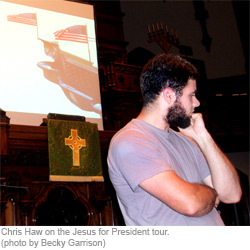 Soccer moms, NASCAR dads, and now holy hipsters have been touted by political pundits and the mainstream media as the group du jour that political candidates must court in order to win the coveted presidential prize. Using select books and blogs, they conclude that these missional millennials have abandoned the political party of their parents and will be casting their ballots for Obama come November. However, as Jim Wallis wrote earlier this year, "This doesn't mean young evangelicals are automatically becoming Democrats (and I don't think they should). It does mean that their agenda is broader and deeper, no longer beholden to a single partisan ideology."
Soccer moms, NASCAR dads, and now holy hipsters have been touted by political pundits and the mainstream media as the group du jour that political candidates must court in order to win the coveted presidential prize. Using select books and blogs, they conclude that these missional millennials have abandoned the political party of their parents and will be casting their ballots for Obama come November. However, as Jim Wallis wrote earlier this year, "This doesn't mean young evangelicals are automatically becoming Democrats (and I don't think they should). It does mean that their agenda is broader and deeper, no longer beholden to a single partisan ideology."
Once again, the Holy Spirit has a way of transcending conventional wisdom, thus shining forth the power of the risen Christ. For example, when CNN covered the Jesus for President tour, the reporter tried to draw the conclusion that this Christian crowd blesses Barack Obama. When I caught Shane Claiborne, Chris Haw, and friends in New York City, yes, some religious progressives present chose to dance to the beat of a Democratic drummer. But Shane & Co. preached and sang to a different tune, proclaiming, "No more donkeys. Long live the lamb." Claiborne notes, "This is not about going left or right, this is about going deeper and trying to understand together. Rather than endorse candidates, we ask them to endorse what is at the heart of Jesus, and that is the poor or the peacemakers. When we see that, then we'll get behind them."
Citing examples where both Democrats and Republicans used Jesus as a political pawn to advance their own agendas, Shane & Co. remind us that we are electing politicos, not prophets. My observations covering American Christianity echo these concerns. Whenever religious leaders choose to walk into any party's campaign headquarters, they risk ending up bowlegged with a bad case of the spiritual rickets.
The Jesus for President tour reminded us all that transformative change will be contingent not on who we vote for Nov. 4, but how we live our lives on Nov. 3 and 5.
This sentiment for a change that transcends partisan politics continues to be echoed by activists such as Tim Kumfer, who stated in a previous God's Politics blog post that, "Widespread social change will not come merely from the election of a 'change candidate,' but from the movements of nonconforming minorities, faith communities, and others, whose lives take the shape of servanthood and whose voices are joined with those on the opposite side of the power equation. This is our real work, to which we must be committed for more than one day in November."
When Diana Butler Bass spoke at the American Academy of Religion's 2007 annual meeting, she reflected that she finds "vitality in those churches who are tapping into a global spirit that infuses religion, politics, and the culture at large, transcending organizations and individuals" [emphasis added]. In The Great Emergence, Phyllis Tickle compares this period of massive upheaval to other reformations, such as the Great Reformation, the Great Schism, and the Great Transformation.
During this time of transformation, how do we avoid being seduced by media attention and power into serving an earthly king instead of our king in heaven? I cover Christian carnage for a living and it pains me when people who I know have good intentions end up advancing their own activist agenda instead of proclaiming the good news. In our quest to practice the radically inclusive politics of Jesus, Tickle keenly observes the need to navigate through these rocky religious waters, "prayerfully and carefully. As is true with any major social or political or religious upheaval, how we can or should navigate it all is not always clear on a day-to-day basis."
One small change that's become evident to me is the need for Christian gatherings to more accurately reflect the body of Christ. For example, I've lost track of the social justice events I've attended these past few years that bore a closer resemblance to Ivy League college reunions or a local Democratic party pow-wow than the kingdom of God.
What keeps us from including the person we see sleeping on the church steps or whom we serve at the soup kitchen? Why can't we create space for those who differ with our political beliefs? Jesus brought together tax collectors, zealots, prostitutes, and the occasional Jewish religious leader. Heck, he even converted the centurion who stood guard during his crucifixion. Now that's a Christian conference I'd like to cover. If we claim Jesus as our Lord, shouldn't our gatherings accurately reflect the ministry espoused by the radical rule-breaking, love-making Jesus? After all, he is our king and we are his kingdom here on earth.
 Becky Garrison will be featured in the documentary The Ordinary Radicals. Also, her interview with Phyllis Tickle, which focuses on Tickle's forthcoming book The Great Emergence,
Becky Garrison will be featured in the documentary The Ordinary Radicals. Also, her interview with Phyllis Tickle, which focuses on Tickle's forthcoming book The Great Emergence, will appear in the August 2008 issue of Sojourners.
Got something to say about what you're reading? We value your feedback!